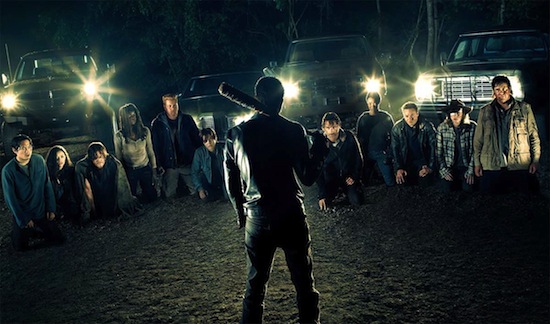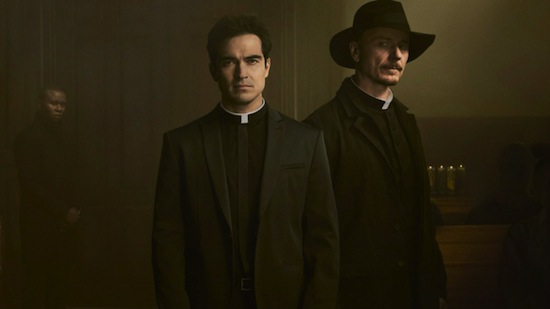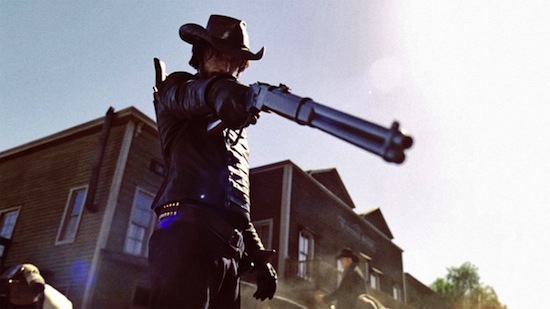Recent US TV has been dominated by soulless automata, the rotting undead, and the machinations of Satan. But as well as the presidential debates, it’s also been a good month for genre fiction.
"This storyline will make Hieronymus Bosch look like he was doodling kittens", declares a writer character in episode two of Westworld, the new HBO series based on the 1973 dystopian sci-fi film of the same name. The presence of a scriptwriter as a major character in the reboot is no incidental detail. This is a show very much about stories, who writes them, and who for.
The titular theme park is driven by a combination of emergent AI behaviour and pre-scripted narratives, which is to say, its structure is immediately familiar to anyone who’s played an open-world video game, specifically one made by Rockstar Games. If the upcoming instalment of the Red Dead Redemption game series doesn’t call in this obvious debt with a Westworld spoof somewhere, I’ll eat both a white and a black hat.
Earlier in the same episode, a veteran park visitor tells his neophyte travelling companion: "You think you have a handle on what this is gonna be, guns and tits and all that mindless shit that I usually enjoy. You have no idea". "Everything in this world is magic" states Anthony Hopkins’ inscrutable Dr. Ford, boss of the park, "except to the magician".
Westworld’s love of meta-commentary, upon itself and on the nature of high-tech entertainment in general is a cute device. For example, when Ford rejects the writer’s proposed storyline, ‘Odyssey On Red River’, events triggering a search along a "blood arroyo" immediately happen anyway, neatly underlining that Ford is not quite in control of his creation. But this tendency also means that this is a show that leans out of the screen, pats you on the knee and says, "I’m kind of a big deal."
And for HBO at least, it is. Their biggest show by a wide margin, Game Of Thrones, is ending in 2018, and the final two seasons are to be short ones, so there’s a pressing need for a replacement. And HBO are betting heavily on Westworld; the original 1973 movie was shot in 30 days for around a million dollars. The pilot episode alone of this reboot reportedly cost $22m, with a total series budget of $100m, over nearly two years of production time.
And you can really see where all that money went. The sets, costuming, and cinematography are all breathtaking, and the cast including Hopkins, Thandie Newton and Ed Harris can’t have come cheap. The CGI is absolutely bleeding edge, with a flashback featuring a faked young Hopkins, and a stunning sequence of machines weaving an artificial eye, one fibrovascular strand at a time. In terms of technical craft, the show is currently without peer on TV.
Were Game Of Thrones what doubters suspect – a witless orgy of swords and tits – finding a successor wouldn’t be such a tall order. But it would have never become the phenomenon it has if it wasn’t more than that. A hallucinatory romp through medieval history; an exploration of class; of the relationships between politics and religion; GoT is a feast for the mind, as much as the senses, and Westworld is awfully keen to establish itself as similar. "The guests don’t return for the obvious things we do, the garish things," Ford lectures his writer. "They come back because of the subtleties. The details."
The trouble is that while Westworld keeps telling us this stuff, it hasn’t yet been showing it to us. There’s rather a lot of the obvious and garish; for no good reason, whenever robots aren’t on active park duty, they are always butt naked, so the show can guarantee weekly nudity with scant narrative justification. And given that the entire point of the park is consequence-free abuse and slaying, well, there’s an awful lot of consequence-free abuse and slaying. The producers are having it both ways so far, by all but having characters say to each other, "Gee, looks like there’s going to be a subversive other side to all this any minute now." But having a character say something sneery about tits and guns doesn’t alter the fact that there are a lot more tits and guns than anything else.
If the above sounds negative, I’ll say that I’m finding the show fairly riveting so far, and if it starts to deliver on its accrual of mysteries and dangling plot strands, it could be something really special. Certainly, the ground is all well-prepared for an exploration of consciousness, free will, power relationships, faith, and all kinds of meaty stuff. In episode four, Dr. Ford posits himself as a de facto god, and seems to hint that his unseen ex-partner Arnold is a Lucifer figure. Newton’s android brothel madam Maeve, meanwhile, is starting to acquire a form of spiritual faith, after accidentally being left switched on while in for repairs.
With this stuff, Westworld has the potential to combine genre-bound thrills with more thoughtful subtexts like nothing since the Battlestar Galactica reboot. But the nagging suspicion that it’s going to "do a Lost" and add up to nothing still lurks.

This habit of yanking the audience from one puzzle to another, with little regard for genuine narrative is becoming an increasingly irritating element of AMC’s The Walking Dead. Both the most wildly popular show on cable TV and surely the grimmest one to have ever made it to seven seasons, TWD has landed once again with a sickening thud and a blood-choked gurgle.
I’ll avoid spoilers, though in truth the show has left little to spoil. We saw exactly what happened at last season’s fan-baiting anti-cliffhanger – a major character got beaten to death with a barbed wire accessorised baseball bat – we just didn’t see who it happened to.
Somewhat unable to help itself from messing with its audience, this episode opens after the deed itself and time hops around for 20 minutes or so before finally getting to it. And of course, it’s horrible. But it’s also strangely affectless. The sudden death of a character who hasn’t had the chance to speak a single line of dialogue since April is, it turns out, dramatically a bit flat.
The problem here is what’s rapidly becoming the show’s greatest flaw. The writing itself presumes you have bought into the hype, the teaser trailers, the fan speculation; and it both drives and is increasingly driven by all that.
This episode gives us a climactic moment with no build; there is no tension to release within the narrative itself, only in what the audience bring to it. I say this is straight up bad writing. And it turns what should have been a moment of genuine shock into a heavily signposted gross out.
The episode is far better when it finally gets this cynical money shot over with. TWD has always been, at heart, a show about ethical and political dilemmas. The apocalyptic backdrop simply serves to give these questions urgency. Along the way, our protagonists have dabbled in and encountered a number of forms of social organisation. Attempts at democracy, attempts at militaristic rule; protagonist Rick Grimes even had a brief experiment with a strange form of pacifism a while back.
In the figure of new villain Negan, the show has finally arrived at unadulterated fascism. Negan quickly demonstrates his absolute power over them, and not with the baseball bat, but with something far less graphic but far more unsettling. One aspect of power is the willingness to do what your opponent won’t, and Negan cheerfully shows us that there are no lines he won’t cross.
This is niggling at me for a couple of reasons. In the previous season, the group’s increasing desensitisation to violence was becoming truly interesting. Ceaseless brutalisation had turned them brutal. "You aren’t the good guys" as a member of the then-unseen Negan’s group bitterly informed them.
The new direction has a strong likelihood of killing that area of contemplation before it really gets going. Negan is so harsh, and so completely nihilistic, that there’s simply no way for anyone to be his moral inferior. So our gang are good by default again. It remains to be seen whether the show finds something interesting to do with this problem.
The other thing that bothers me is that in a world of absolute power and absolute duress, there are no dilemmas. The group aren’t presented with greater or lesser evils, or even equivalent ones. At the point at which Rick’s will is completely broken there is simply no choice. This makes for a bracing and horrifying watch, but I’m not quite sure what the point of it is.
Showrunner Scott Gimple is now so good at the mechanics of the show, he can get away with nothing but the mechanics. Last season’s finale was designed to propel viewers into this premier, and with ratings around 17 million, it’s obviously worked. But we’ve really learned nothing, apart from the answer to the bleakest game of Guess Who? of all time. Here’s something horrible, and see you next week.
It’s inevitable that the show will eventually run out of subtextual things to say about the corrosion of morality in extremis, and have to fall back on saying textual things about being a post-apocalyptic badass. I’m not against that, but given how much more it’s been, how often, it’s a little unsatisfying.

The Exorcist, Fox’s TV reboot of the 1973 movie, has none of these problems, because it is unabashedly ludicrous right from the outset. Playing very fast and loose with the source material, Max von Sydow’s elderly exorcist Father Merrin becomes Ben Daniels’ Father Marcus, a wiry, fighty, low-cut douche-vest wearing, gun-toting, shouting-in-Aramaic battle priest. The younger priest from the movie, Father Karras, gloomily struggling with the secret loss of his faith, becomes Father Tomas Ortega, a handsome and optimistic chap who dispenses with the question of doubt in two lines of dialogue, and gets right down to business.
Where the film spends at least half of its running time on the idea that the possessed victim may simply be suffering a mental disorder, the show gets all that nonsense out of the way almost immediately. That possession is real and exorcism is the obvious practical choice is firmly established before the end of the first episode. Explicitly supernatural things happen constantly; a man spontaneously combusts in the street; a raven deliberately smashes into a window, impaling itself; Father Ortega astrally projects into one of Marcus’s exorcisms. It is absolutely deranged from top to bottom, and immense fun.
Being a network show, it can’t indulge in the visual extremes allowed on cable, and therefore discards some of the movie’s most memorable images. The hideous disfigurement of the possessed girl becomes no more than a film of perspiration and a very slight de-prettifying, and there is nothing remotely like the notorious crucifix masturbation scene.
However, it’s unusual to see a show so heavy on the Catholicism, and it makes smart use of this to suggest things it can’t explicitly show. The demon sitting on the girl’s chest is a loud and clear shout to anyone who knows their Christian demonology that the possession is sexual in nature. There’s also a whole strand about the internal politics of the RCC, with even a fictional Pope showing up in a few scenes. And the issue of confession looms large over the whole thing, leading to a genuinely surprising and effective mid-season twist, that ties back to the movie, answers multiple questions, and points the show in an entirely new direction. And that, Scott Gimple, is how you do a cliffhanger.


